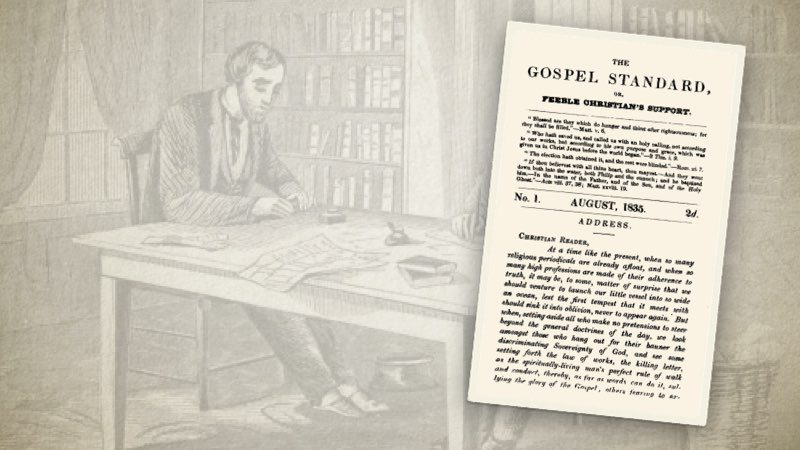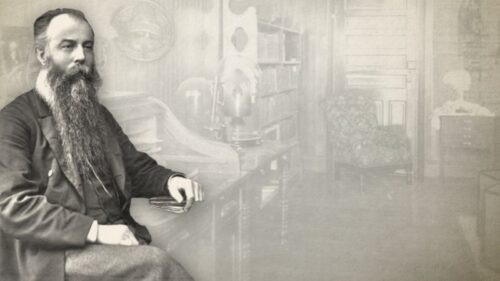-
The “Old School Baptists” In America
Gospel Standard Magazine No. 102 — June, 1844 — Vol. 10, Pages 161-165 [The letters below were written to our departed friend W. Gadsby, and would have appeared earlier but from the pressure of other matter. Mr. Booth's letter will, we think, be found to contain an interesting account of our American brethren. We do not mean to say that we approve of all that is contained in it; but we did not consider ourselves at liberty to alter or omit. It is to the "Old School Baptists"[1] that James Osbourn, whose experience we have reviewed, belongs; and in several of his works which we have read, (and we believe we possess them all,) he frequently speaks of them, and seems to be fully united…
-
Title Page And Preface
Theological Dictionary by Charles Buck ------------------------------------------------------------ Charles Buck (1771-1815) was an English Independent minister, best known for the publication of his “Theological Dictionary”. The first edition was printed in 1802, followed by fifty reprints. Buck writes:[1] "I had been for some time employed in preparing for the press my Theological Dictionary, a work which cost me much labour day and night, and no one to assist me, except now and then the bare copying of an article. The vast variety of books to be consulted, the discriminations to be made, the difficulty of seizing those accurate definitions I wanted, the various opinions of authors on the same subject, the including every article in Ecclesiastical History, Theology, and Morals, rendered it rather a formidable work for…
-
Table Of Contents: New Order
As it is my goal to align John Gill’s “Body of Doctrinal and Practical Divinity” with the Framework of Sovereign Grace, I have rearranged the eleven branches of theology, together with the individual chapters, in order to demonstrate how they fit together in the grand scheme of God’s masterplan for the ages. I have reduced the original eleven “Books” (or branches) to three main headings—(1) Of God; (2) Of God’s Revelation; (3) Of God’s Works. I have also reduced the original one hundred fifty-six chapters to one hundred fifty-one, having subtracted the five chapters belonging to the Appendix (a dissertation on the baptism of Jewish Proselytes). Under the first heading, “Of God”, there are thirty chapters. The first nine speak on the Godhead in general,…
-
Table Of Contents: Original Order
John Gill’s “Body of Doctrinal and Practical Divinity” was originally published in four volumes. The first two volumes were published in 1769, and were entitled, “A Body Of Doctrinal Divinity”. They were divided into seven “Books”, each of which dealt with a particular branch of doctrinal theology—Book 1: Of God, His Word, Names, Nature, Perfections And Persons; Book 2: Of The Acts And Works Of God; Book 3: Of The External Works Of God; Book 4: Of The Acts Of The Grace Of God Towards And Upon His Elect In Time; Book 5: Of The Grace Of Christ In His States Of Humiliation And Exaltation, And In The Offices Exercised By Him In Them; Book 6: Of The Blessings Of Grace, And The Doctrines Of…
-
An Introduction To John Gill’s “Doctrinal And Practical Body Of Divinity”
In the year 1999, I became the pastor of Bethesda Chapel, a Strict and Particular Baptist church[1] in London, England. I was a Moderate-Calvinist for the first ten years of my ministry, although I refused to identify with the Reformed Baptist Movement.[2] In the year 2010, the congregation came under internal and external pressures to adopt a plural eldership.[3] I resisted this pressure for scriptural, historical and practical reasons, but at the time, I was not well informed on the issues. Three years later, I completed an exhaustive study on the subject, resulting in an unpublished book, in excess of a thousand pages. My initial resistance to the Reformed Baptists’ views on plural elderships was confirmed and staunchly defended. It was at that time, early…
-
Title Page And Preface
A Body Of Doctrinal And Practical Divinity Or, A System Of Practical Truths Deduced From The Sacred Scriptures By John Gill 1815 Preface John Gill was born in Kettering, Northamptonshire, England, on November 23rd, 1697. At age 12, he was converted to Christ under the preaching ministry of William Wallis. However, he waited six years before agreeing to be baptized, after which he became a member of his local church. At the age of 23, he was inducted as pastor of the Strict and Particular Baptist Horselydown church, the office of which he held until his death on October 14th, 1771. His 50 year pastoral ministry was accompanied by a prolific written ministry. He was the first Baptist to write an exhaustive theological treatise, which…










